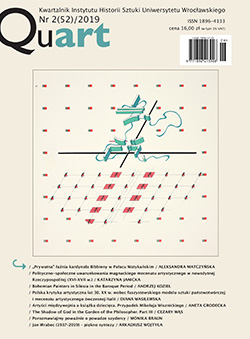 Numer 2(52)/2019
Numer 2(52)/2019
Editorial
Bearing in mind that art history, like love, has many names, we decided to present here you with a panorama of texts which is truly silva rerum-like and that itself makes it already extremely interesting. The first one is the revelation of the most secret places in the Vatican Palace in Rome and a reference to the recently trendy topic of private life of Catholic hierarchs (Aleksandra Matczyńska). They were very often patrons of the most eminent artists of the time. In the article by Katarzyna Janicka, we can read about what the relatively poorly known patronage of magnate courts in Poland in the 16th and 17th centuries looked like. The era of the “golden age” of art in Silesia is brought closer to us by Andrzej Kozieł, who shows the influence of Czech artists on the then Baroque painting of the region. The language of Polish criticism, this time from the 20th century, is also revealed in connection with the analysis of its reaction to art and the forms of state patronage in fascist Italy (Diana Wasilewska). The interwar period was the time when illustrated children’s books were in bloom too. Aneta Grodecka’s article becomes part of the earlier description of this artistic phenomenon in our quarterly, now in the context of a presentation of the illustrative activity of a little-known artist, Mikołaj Wisznicki. The whole is complemented by: the third part of a comprehensive study by Cezary Wąs devoted to the Parc de la Villette in Paris and an equally intellectually in-depth work by Monika Braun about Wojciech Kaniowski, an artist from Wrocław.
At the end, a very sad news for all enthusiasts of art and its history. Professor Jan Wrabec, a long-time employee of the Department and Institute of Art History in Wrocław, an outstanding researcher of Baroque architecture and our friend, died on 17 April. Arakadiusz Wojtyła presents his person in an obituary with a very meaningful subtitle – “the beauty of synthesis”.
I can only wish that this “beauty of synthesis” will accompany you during the reading of the latest issue of “Quart”, remembering, however, that also analysis in art sciences has its undeniable charms.
On behalf of the Editors
Prof. Dr. Hab. Waldemar Okoń
SPIS TREŚCI / TABLE OF CONTENTS:
![]() Spis treści / Table of Contents
Spis treści / Table of Contents
2
Od Redakcji
3
/Aleksandra Matczyńska/
![]() „Prywatna” łaźnia kardynała Bibbieny w Pałacu Watykańskim
„Prywatna” łaźnia kardynała Bibbieny w Pałacu Watykańskim
![]() Cardinal Bibbiena’s “private” bathing chamber in the Vatican Palace. Summary
Cardinal Bibbiena’s “private” bathing chamber in the Vatican Palace. Summary
15
/Katarzyna Janicka/
![]() Polityczno-społeczne uwarunkowania magnackiego mecenatu artystycznego w nowożytnej Rzeczypospolitej (XVI–XVII w.)
Polityczno-społeczne uwarunkowania magnackiego mecenatu artystycznego w nowożytnej Rzeczypospolitej (XVI–XVII w.)
![]() Political and social conditions of magnate “artistic patronage” in the modern Rzeczpospolita (16th–17th centuries). Summary
Political and social conditions of magnate “artistic patronage” in the modern Rzeczpospolita (16th–17th centuries). Summary
33
/Andrzej Kozieł/
![]() Bohemian Painters in Silesia in the Baroque Period. Career Paths and Recipes for Success
Bohemian Painters in Silesia in the Baroque Period. Career Paths and Recipes for Success
![]() Bohemian Painters in Silesia in the Baroque Period. Career Paths and Recipes for Success. Summary
Bohemian Painters in Silesia in the Baroque Period. Career Paths and Recipes for Success. Summary
53
/Diana Wasilewska/
![]() Polska krytyka artystyczna lat 30. XX w. wobec faszystowskiego modelu sztuki państwotwórczej i mecenatu artystycznego ówczesnej Italii
Polska krytyka artystyczna lat 30. XX w. wobec faszystowskiego modelu sztuki państwotwórczej i mecenatu artystycznego ówczesnej Italii
![]() Polish artistic criticism of the 1930s regarding the fascist model of state-creating art and artistic patronage of then Italy. Summary
Polish artistic criticism of the 1930s regarding the fascist model of state-creating art and artistic patronage of then Italy. Summary
67
/Aneta Grodecka/
![]() Perły z lamusa. Artyści międzywojnia a książka dziecięca. Przypadek Mikołaja Wisznickiego
Perły z lamusa. Artyści międzywojnia a książka dziecięca. Przypadek Mikołaja Wisznickiego
![]() Pearls from the lumber-room. Artists of the interwar period and children’s books. The case of Mikolaj Wisznicki. Summary
Pearls from the lumber-room. Artists of the interwar period and children’s books. The case of Mikolaj Wisznicki. Summary
89
/Cezary Wąs/
![]() The Shadow of God in the Garden of the Philosopher. The Parc de La Villette in Paris in the context of philosophy of chôra. Part III
The Shadow of God in the Garden of the Philosopher. The Parc de La Villette in Paris in the context of philosophy of chôra. Part III
![]() The Shadow of God in the Garden of the Philosopher. The Parc de La Villette in Paris in the context of philosophy of chôra. Part III. Summary
The Shadow of God in the Garden of the Philosopher. The Parc de La Villette in Paris in the context of philosophy of chôra. Part III. Summary
121
/Monika Braun/
![]() Porozmawiajmy poważnie o powadze szydercy
Porozmawiajmy poważnie o powadze szydercy
![]() Let’s talk seriously about the seriousness of the scoffer. Summary
Let’s talk seriously about the seriousness of the scoffer. Summary
145
/Arkadiusz Wojtyła/
![]() Jan Wrabec (1937–2019) – piękno syntezy
Jan Wrabec (1937–2019) – piękno syntezy
![]() Prof. Jan Wrabec – beauty of synthesis. Summary
Prof. Jan Wrabec – beauty of synthesis. Summary
Czasopismo indeksowane w Bazie Czasopism Humanistycznych
i Społecznych
BazHum.
Czasopismo indeksowane w CEJSH: The Central European Journal of Social Sciences and Humanities.
Czasopismo indeksowane w ERIH+: European Reference Index for the Humanities.
Czasopismo indeksowane w:
Index Copernicus International
World of Journals
Czasopismo ujęte w wykazie czasopism naukowych MEiN
z dnia 17.07.2023
(100 punktów).
Czasopismo nagrodzone grantem w ramach programu „Wsparcie 500 czasopism naukowych” Ministerstwa Nauki i Szkolnictwa Wyższego.
ISSN 1896-4133 (dla wydania drukowanego)
ISSN 2449-9285 (dla wydania elektronicznego)
www ® Aga Jarząb
apm@apmltd.com


